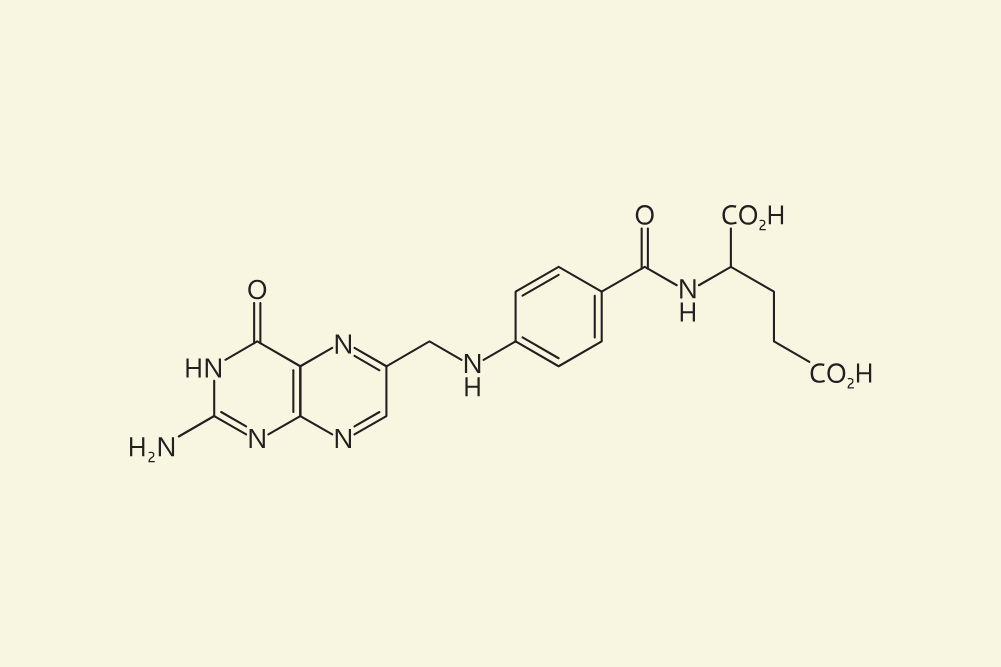Folic Acid
Along with vitamins B12 and B6, folic acid is a major regulator of the DNA methylation processes in the body. Food sources include green leafy vegetables (folate is derived from the Latin for foliage), chickpeas, liver, fortified breads and cereals, and brewer’s yeast. Folate deficiency is considered one of the most common vitamin deficiencies in humans. Studies have also shown that a zinc deficiency can reduce the body’s efficiency in metabolising folate, as well as cause lower plasma folate and decreased folate in the liver.
In the 1960s, the discovery was made that folic acid was important in the prevention of neural tube defects in babies. In the ‘70s and ‘80s, it was shown to be a critical nutrient in the prevention of cervical dysplasia. Following this was the discovery that folic acid was essential for preventing atherosclerosis associated with increased homocysteine. Since then, a deficiency has also been linked to an increased risk of various cancers, including colorectal cancer.
Therapeutic uses
Pregnancy & neural tube defects
Folic acid is important because supplementation around the time of conception has been shown to lower the risk of babies being born with a neural tube defect such as spina bifida. This is an increasing issue with multiple births.
Hypomethylation & hypermethylation
Methylation is a critical metabolic process that occurs mainly in the liver and the gut. It involves modification of DNA in the regulation of gene expression. Undermethylation can result in increased inflammation and sensitivity to carcinogens, resulting in the tumour initiation process. Hypermethylation, on the other hand, can result in the suppression of the activity of tumour suppressor genes, thus increasing the progression of cancers. Bioavailable forms of folate may better support methylation metabolism.
Defects in the methylation process can occur from deficiency but also from a genetic abnormality of the methylenetetrahydrofolate reductase gene (MTHFR), leading to high homocysteine levels, which are in turn implicated in vascular thromboembolism, coronary artery disease (atherosclerosis), cataracts and cancer initiation (ie colorectal cancer).
Two large research cohort studies were conducted on 72,348 women in 1990–2010 and 44,504 men in 1986–2010. Plasma homocysteine and the link between diet and risk of peripheral artery disease (PAD) was examined. High homocysteine and low folic acid levels were associated, and dietary folate intake was inversely linked with risk of PAD in men but not in women.
Another study showed that elevated homocysteine levels were an independent risk factor for vascular disease and that low levels of folic acid (with vitamins B6 and B12) were critical in the regulation of homocysteine metabolism, deficiencies increasing the risk of myocardial infarction.
Folic acid & cognitive function
Folic acid in conjunction with vitamin B12 has been shown to lift cognitive function and reduce depression in the elderly and younger people. A deficiency can manifest as apathy, irritability, restless leg syndrome and a slowing of mental processes.
Digestive system
Folate deficiency worsens the breakdown of the gut lining, leading to inflammation, diarrhoea, ulcers, colitis, poor absorption and further deficiencies. Cracks in the corners of the mouth and a swollen tongue are other symptoms.
Haematological
Low folic acid and vitamin B12 lead to pernicious anaemia, along with low white cells and natural killer cells (increased risk of infection), as well as low platelets (increased risk of bleeding).
Drug-nutrient interactions
Folate levels may be reduced by anticonvulsant medication for epilepsy (and supplementation may in turn reduce the effectiveness of the medication); oestrogens and the contraceptive pill; sulfasalazine and cholestyramine (reduce absorption); and methotrexate and similar drugs are antagonistic, so supplementing folic acid will reduce side effects.
Folic acid for all?
While folic acid deficiency is very common, fortifying foods with this nutrient has raised issues that need to be considered. A high level of folic acid and low B12 in older people has been associated with increased risk of cognitive impairment and anaemia. In pregnant women, high levels have resulted in increased risk of insulin resistance and obesity in their children. Folate has a dual effect on cancer: protecting against cancer initiation but increasing the progression and growth of precancerous cells. The research is therefore suggesting that a high folic acid intake may be harmful for some people. As our understanding of genetics and personalised nutrition grows, the conversation around folate is evolving, especially in relation to mental health, detoxification and hormone balance.
References available on request.








